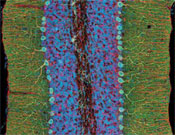Contents
News from NCRR
Four New Members to Serve on NCRR Advisory Council
The 18 members of the National Advisory Research Resources Council advise NCRR on polices and programs and perform second-level peer review of grant applications. Four new members, who are leaders in their respective professions, have recently been appointed to serve four-year terms.

William F. Bria, II, chief medical information officer at Shriners Hospitals for Children and clinical associate professor of internal medicine at the University of South Florida in Tampa. Bria has been a leader in applied medical informatics for more than 20 years and has authored numerous articles and books on informatics. He is currently engaged in research and applied medical informatics and is developing a new five-year combined M.D./master's program for informatics at the University of Michigan.

Wendy Chaite, president of the Lymphatic Research Foundation. Chaite, whose daughter was born with systemic visceral and peripheral lymphatic disease and lymphedema, is an advocate for lymphatic research. In 1998 she founded the Lymphatic Research Foundation, a not-for-profit organization dedicated to promoting and supporting lymphatic research and to fostering an interdisciplinary field of research. Chaite also serves as emeritus director of Research!America and is a former member of the NIH Council of Public Representatives (COPR) and a former COPR liaison to the NIH Advisory Committee to the Director.

Henry N. Ginsberg, Irving Professor of Medicine and director of the Irving Institute for Clinical and Translational Research at the College of Physicians and Surgeons of Columbia University. Ginsberg is part of a group that will be studying the role of glycemic, lipid, and blood pressure control in the prevention of cardiovascular disease in patients with diabetes. This 10-year trial will involve 10,000 patients at six sites across the United States. Ginsberg also has a long record of research into the effects of diet on lipid and lipoprotein metabolism in humans and has conducted numerous controlled feeding studies in humans.

Dallas M. Hyde, director of the California National Primate Research Center and professor at the School of Veterinary Medicine at the University of California, Davis. Hyde conducts research on the interactions of white blood cells, epithelial cells, and other types of cells in the lungs, with an emphasis on asthma, pulmonary fibrosis, and emphysema in animal models.
NCRR Launches National Gene Vector Biorepository
NCRR has replaced its gene vector laboratories program with a national gene vector biorepository and coordinating center, with a three-year grant to Indiana University School of Medicine. The new center, directed by Kenneth Cornetta, will be a central storehouse for gene therapy materials and will promote gene therapy research by permitting the sharing of information to promote discoveries, patient safety, and compliance with the FDA and to broker material transfer agreements between researchers and owners of patentprotected or proprietary reagents.
"This resource will maximize our investment in gene vector research and help translate new knowledge into tangible benefits for patients," says NCRR Director Barbara Alving. For more information, visit www.ngvbcc.org.
NCMIR Scientist Wins Photographer of the Year

One of Deerinck's 10 award-winning images depicts the midsagittal section of a rat cerebellum. The image above was acquired with one of NCMIR's confocal microscopes.
Thomas J. Deerinck, a researcher at the University of California, San Diego's NCRR-supported National Center for Microscopy and Imaging Research (NCMIR), received first place in the science category at the prestigious Sony World Photography Awards. Submitted micrographs — images taken through a microscope — depicted NCMIR's cutting-edge research and included a variety of tissues and cancer cells.
An NCRR Biomedical Technology Research Resource, NCMIR was established in 1988 and is led by principal investigator Mark H. Ellisman. It leads the way in technologies for high-throughput multiscale imaging and analysis of biological systems, with an emphasis on mechanisms underlying diseases of the nervous system.
Deerinck's images have been featured on the covers of scientific journals and in museum shows. In recent years, Deerinck has won numerous prizes in various photography competitions. More Deerinck micrographs



